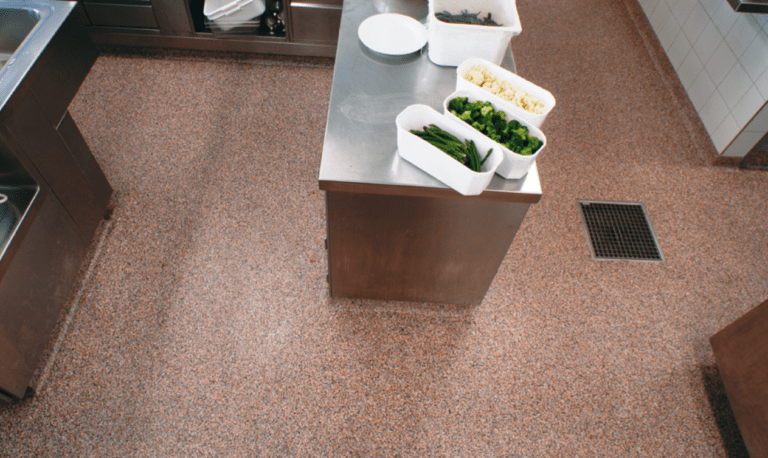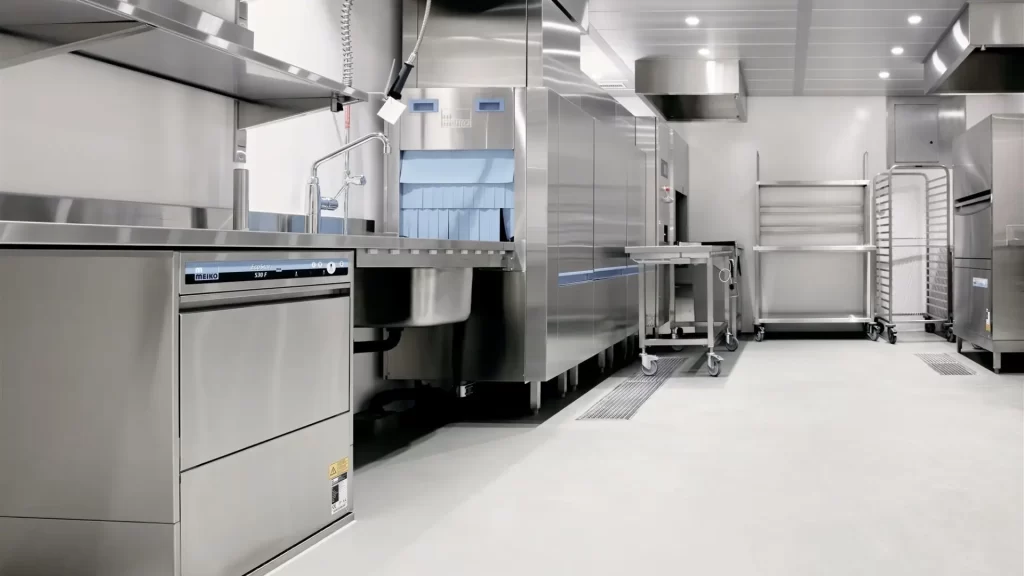
When it comes to commercial kitchens, flooring is essential. It’s a demanding area that needs to look great while also performing well. With pounding feet, constant exposure to grime, grinding equipment, and spills, your kitchen floor and the coatings that protect it can become a valuable investment.
We’re here to assist you in understanding the unique requirements of a commercial kitchen floor. This kitchen flooring guide delves into the intricacies of kitchen flooring and describes how to use floor coatings to make the most of this critical piece of your commercial space.
Why Commercial Kitchen Floor Matters?
Anyone who has worked in the commercial food industry understands how important kitchen flooring is. However, the space has unique needs that go far beyond those of standard flooring. Here are a few reasons why kitchen floors are challenging to maintain:
Visual appeal: Commercial kitchen floor needs to be attractive on top of performing at a high level. Promote the business’s unique ambiance and reassure customers that food production spaces are clean.
Heavy traffic: Commercial kitchen floors take a beating. They must maintain their strength in the face of heavy foot traffic.
Safety requirements: Flooring should always help keep employees safe and productive. That means it must be slip-resistant while also resisting grease and chips.
Sanitation regulations: With such a high potential for food buildup, pooling, and bacteria collection, kitchen floors must be seamless and easy to maintain.
Why is Epoxy the best flooring for Commercial Kitchens?
Epoxy flooring is a long-lasting, customizable, sustainable floor solution for commercial operations. There are several reasons why kitchen and restaurant owners choose epoxy flooring for their business. Here are the benefits of choosing epoxy for commercial spaces:
Epoxy Brightens Your Area
Compared to other flooring materials, epoxy coatings produces high-gloss floor surfaces. As a result, the surfaces in your space reflect light, making your kitchen spaces brighter.
Simple To Clean
To avoid unnecessary legal disputes, fines, and penalties from local health authorities, you must demonstrate that your kitchen is safe to prepare food for public consumption. Epoxy is the solution to create kitchen floors that meet the cleanliness levels required in commercial kitchen floors.
Epoxy Is Non-Slip
Spills are common occurrences in busy commercial kitchens. Unfortunately, these spills can lead to slipping and falling among your employees, which is dangerous. However, you can avoid this problem by using epoxy for your flooring. It is non-slip and will significantly reduce the number of falls on regular floors.
Water and Oil Resistant
Unlike some flooring materials, epoxy is resistant to water and oil stains and will not absorb water and weaken over time. As a result, epoxy floor coating is a lifesaver in a kitchen environment prone to water and oil spills.
Epoxy Looks Good on Floors!
Epoxy coating also comes in various patterns that can be used as decorative materials. The pattern options can provide exceptional floor decorations to assist you in designing appealing surfaces. This feature can help you brand your kitchen to match your business.
Get the Best Commercial Kitchen Flooring Results
For your commercial kitchen floor to perform its best, it’s wiser to involve flooring experts. At the end of the day, you need a correctly done working floor to get all of the benefits we’ve discussed.
With SSP Coatings Garage Flooring Company, you can take advantage of the latest technology in the flooring industry. Call us at 423-342-4158 and get the best epoxy floors for your commercial kitchen.

